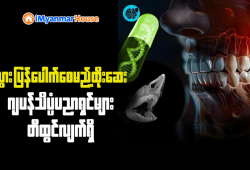
Foreign Property News | Posted by Aye Myat Thu
A gunshot to the head inadvertently cured a man of his mental illness.
a New York Times story from February 25, 1998, that detailed a 19-year-old man with obsessive-compulsive disorder who shot himself in the head in a suicide attempt and ended up curing the mental illness without causing any other brain damage.
The patient, "George," had dropped out of school and quit his job because he washed his hands hundreds of times a day and took frequent showers.
From the Times:
''George was also very depressed and told his mother that his life was so wretched that he would rather die,'' Dr. Solyom related. ''She said, 'So look George, if your life is so wretched, just go and shoot yourself.' So George went to the basement, stuck a .22-caliber rifle in his mouth and pulled the trigger.''
The bullet lodged in the left front lobe of the brain. Surgeons removed it but could not get out all the fragments.
''When he was transferred to our hospital three weeks later, he had hardly any compulsions left,'' Dr. Solyom said.
Doctors say the bullet accidentally disrupted the part of his brain driving compulsions — while leaving the rest intact.
In an extraordinary case that stunned doctors, a gunshot to the head inadvertently cured a young man’s severe obsessive-compulsive disorder (OCD). The patient, identified only as “George,” had spent years trapped in compulsions—washing his hands hundreds of times daily and taking constant showers. At 19, he attempted suicide with a .22-caliber rifle, leaving a bullet lodged in his left frontal lobe. While surgeons were unable to fully remove the fragments, the aftermath revealed a startling change.
Within three weeks, George’s compulsive behaviors had nearly vanished. Over the next five years, he reintegrated into society, excelling in both work and academics.
Over the following five years, George got a job and became a straight-A college student, according to the study in Physician's Weekly, a British journal of psychiatry.
According to his physician, Dr. Laszlo Solyom, the bullet appeared to have disabled the part of his brain driving OCD, while leaving other cognitive functions intact. Though experts stress that this is an extraordinarily rare and accidental event—not a treatment—George’s story underscores how much remains unknown about the brain’s role in mental illness and the potential for new therapeutic insights hidden within its circuitry.
Source: New York Times (Feb 25, 1988). "Brain Wound Eliminates Man's Mental Illness"









